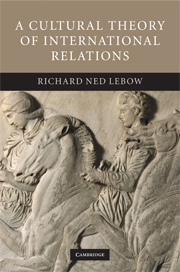Book contents
- Frontmatter
- Contents
- List of figures and tables
- Acknowledgments
- 1 Introduction
- 2 Fear, interest and honor
- 3 The spirit and its expression
- 4 The ancient world
- 5 Medieval Europe
- 6 From Sun King to Revolution
- 7 Imperialism and World War I
- 8 World War II
- 9 Hitler to Bush and beyond
- 10 General findings and conclusions
- Bibliography
- Index
1 - Introduction
Published online by Cambridge University Press: 03 July 2009
- Frontmatter
- Contents
- List of figures and tables
- Acknowledgments
- 1 Introduction
- 2 Fear, interest and honor
- 3 The spirit and its expression
- 4 The ancient world
- 5 Medieval Europe
- 6 From Sun King to Revolution
- 7 Imperialism and World War I
- 8 World War II
- 9 Hitler to Bush and beyond
- 10 General findings and conclusions
- Bibliography
- Index
Summary
Poetry can give some satisfaction to the mind, wherein the nature of things doth seem to deny it.
Francis BaconThere are few general theories of international relations. One reason for this may be its relatively late emergence as a field of study. The first department and chair of international relations – both at the University of Wales in Aberystwyth – were established only in 1919. More fundamentally, the nature of the subject inhibits theoretical development. International relations is at the apex of multiple levels of social aggregation, and is significantly influenced, if not shaped, by what happens at other levels. A good theory of international relations presupposes a good understanding of politics at all these other levels. It would be something akin to a unified field theory in physics. Einstein devoted his mature decades to this goal, and failed, as anyone would in the absence of more knowledge about the individual forces that have to be subsumed by a general theory. Our knowledge of politics at all levels of interaction is even more fragmentary, as is our understanding of how other disciplines can augment this knowledge.
There is more than one way to skin a cat, and clever political scientists have devised alternative strategies for theorizing about international relations. The most obvious move is to ignore the need to understand politics holistically and to assume that patterns of international behavior can be studied independently of what transpires at other levels of interaction.
- Type
- Chapter
- Information
- A Cultural Theory of International Relations , pp. 1 - 42Publisher: Cambridge University PressPrint publication year: 2008



